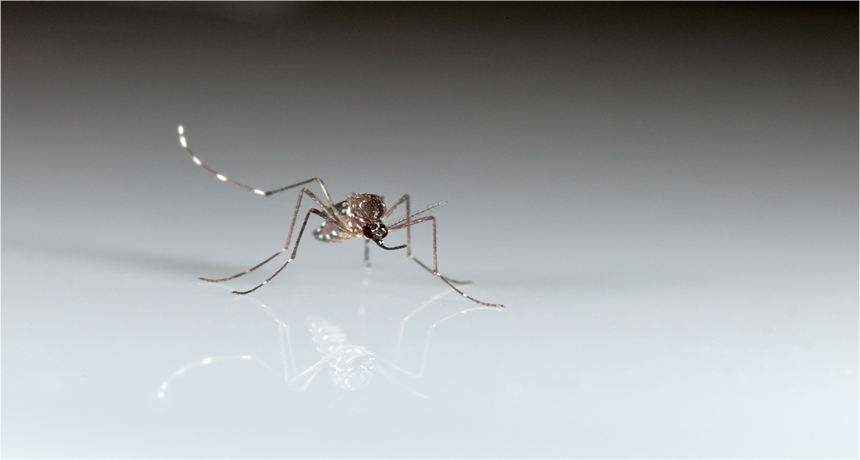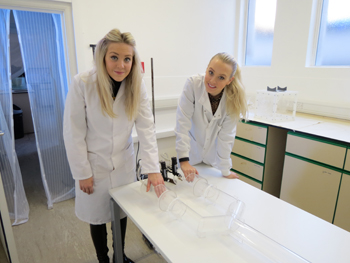Do mosquitoes love you? Blame your parents
Your genes can make you produce signature scents that attract — or repel — biting insects.

Some people may be genetically programmed to attract hungry mosquitoes.
PLOS ONE Fernández-Grandon et al.
Mosquitoes are picky eaters. The biting insects go after some of us more than others. Why? Clues lurk within our DNA, a new study finds.
Some people claim they can ward off mosquitoes by drinking beer or eating smelly foods such as garlic. When scientists have tested such claims, they found them false — or at best, unconvincing.
But each of us produces our own natural odors. It is known that mosquitoes find some of these scents especially inviting. And certain lucky people give off scents that keep biting insects away. Soap and perfumes certainly affect how we smell. But science also has shown that our skin odors are rooted at least partly in our genes.
Mandela Fernández-Grandon studies how odors affect animal behavior. While he was working at the London School of Hygiene and Tropical Medicine in England, he was part of an international team. That group of scientists tested whether genes might explain why those blood-sucking insects don’t find us all equally yummy.
The researchers recruited 37 pairs of twins to take part in tests.
Researchers often study twins to tease out genetic effects. Identical twins have the same genes. But as adults, they may differ quite a bit. They may work different jobs, live in very different regions, hang out in very different social groups. Such lifestyle factors may matter more than genes, depending on what a study is measuring. For instance, a recent twins study determined that the strength of our body’s defense system depends less on genes and more on environmental influences.

The international team recruited both identical and fraternal (non-identical) twins. If a trait is shared far more strongly by identical twins than any other pairs of individuals, even fraternal twins — scientists will conclude that the trait has a genetic basis. That means it traces to the particular mix of genes inherited from a person’s parents.
Getting volunteers for the new tests wasn’t easy. “When people heard ‘mosquitoes’ and ‘biting,’ some got scared and backed out,” Fernández-Grandon told Science News for Students. But they need not have worried, he added. The brave recruits who took part wouldn’t face a wild swarm of blood suckers.
Indeed, he notes, “No one got bit.”
In the lab, each pair of siblings placed one hand at the end of a Y-shaped tube (see image above). Mosquitoes released into the long part of the “Y” could sense the odor of each volunteer’s hand. They quickly flew toward whichever hand smelled like a better meal. But they couldn’t dine on that hand, Fernández-Grandon says. Wire mesh on the ends of the tube kept the insects from reaching the volunteer’s skin.
With identical twins, similar numbers of mosquitoes flew toward each sibling’s hand. Among fraternal twins, however, the insects noticeably preferred one sibling over the other.
SCIENCE BITES This video describes how twins helped scientists home in on what makes some people more or less attractive to mosquitoes. London School of Hygiene & Tropical Medicine |
“It’s the genes that cause a person to have that signature odor that mosquitoes pick up on,” Fernández-Grandon says. This points to some “genetic component to the smell,” he concludes. (Fernández-Grandon now works at the University of Greenwich, also in England.)
Although the study was small, Niels Verhulst was “surprised the differences were so clear.” Verhulst is an entomologist, or scientist who studies insects. He works at Wageningen UR, a university and research center in the Netherlands. His research has shown that the microbes living on skin can make a person more or less attractive to mosquitoes. (That finding supports something else scientists know — that we get stinky when skin bacteria convert odorless sweat molecules into foul-smelling ones.)
Researchers don’t yet know how powerfully our genes determine which kinds of bacteria live on our skin. “How often you wash yourself, what you eat, whether you use deodorant… those could also influence your skin bacteria,” Verhulst says.
The London-based team plans to continue its research. The scientists hope to learn which genes underlie the scents that mosquitoes find attractive — or repellent. Such data might do more than just reduce itchy bug bites. They might actually save lives.
Some mosquitoes spread serious diseases such as dengue (DEN-gay) fever and malaria. Each year, dengue sickens some 50 million people and kills 22,000. About a half million die each year from malaria. The twins study used the species of mosquito that spreads dengue fever. And by understanding what scents lure or repel the insects, Fernández-Grandon says, researchers may be able to make more effective mosquito repellents.
Power Words
(for more about Power Words, click here)
bacterium (plural bacteria) A single-celled organism. These dwell nearly everywhere on Earth, from the bottom of the sea to inside animals.
behavior The way a person or other organism acts towards others, or conducts itself.
dengue fever A potentially lethal infectious disease transmitted by mosquitoes. No vaccine yet exists to prevent infection with the virus responsible for the disease, which causes high fevers, severe headache, joint pain, pain behind the eyes, rash, bone pain and sometimes mild bleeding. A more severe form of the disease, known as dengue hemorrhagic fever can cause uncontrolled bleeding if not treated right away.
DNA (short for deoxyribonucleic acid) A long, double-stranded and spiral-shaped molecule inside most living cells that carries genetic instructions. In all living things, from plants and animals to microbes, these instructions tell cells which molecules to make.
entomology The scientific study of insects. One who does this is an entomologist.
environment The sum of all of the things that exist around some organism or process and the conditions they create for that organism or process.
fraternal (in genetics) The term for a type of twin birth where each baby comes from a separate fertilized egg. This is in contrast to identical twins, which result from a single fertilized egg (creating two separate but nearly identical babies).
gene (adj. genetic) A segment of DNA that codes, or holds instructions, for producing a protein. Offspring inherit genes from their parents. Genes influence how an organism looks and behaves.
genetic Having to do with chromosomes, DNA and the genes contained within DNA. The field of science dealing with these biological instructions is known as genetics. People who work in this field are geneticists.
insect A type of arthropod that as an adult will have six segmented legs and three body parts: a head, thorax and abdomen. There are hundreds of thousands of insects, which include bees, beetles, flies and moths.
malaria A disease caused by a parasite that invades the red blood cells. The parasite is transmitted by mosquitoes, largely in tropical and subtropical regions.
microbe Short formicroorganism. (see microorganism)
microorganism A living thing that is too small to see with the unaided eye, including bacteria, some fungi and many other organisms such as amoebas. Most consist of a single cell.
molecule An electrically neutral group of atoms that represents the smallest possible amount of a chemical compound. Molecules can be made of single types of atoms or of different types. For example, the oxygen in the air is made of two oxygen atoms (O2), but water is made of two hydrogen atoms and one oxygen atom (H2O).
sibling A brother or sister.
trait A characteristic feature of something. (in genetics) A quality or characteristic that can be inherited.







